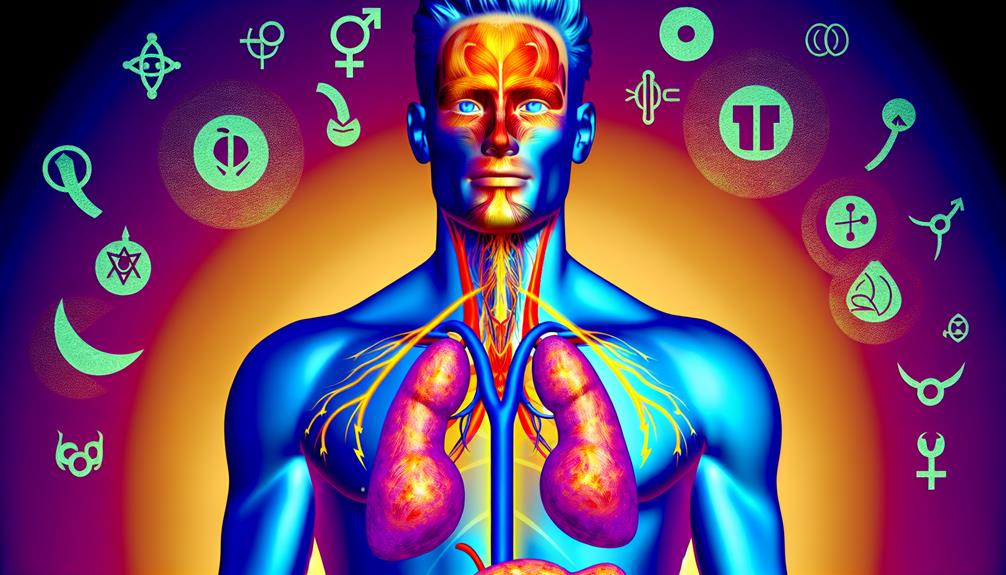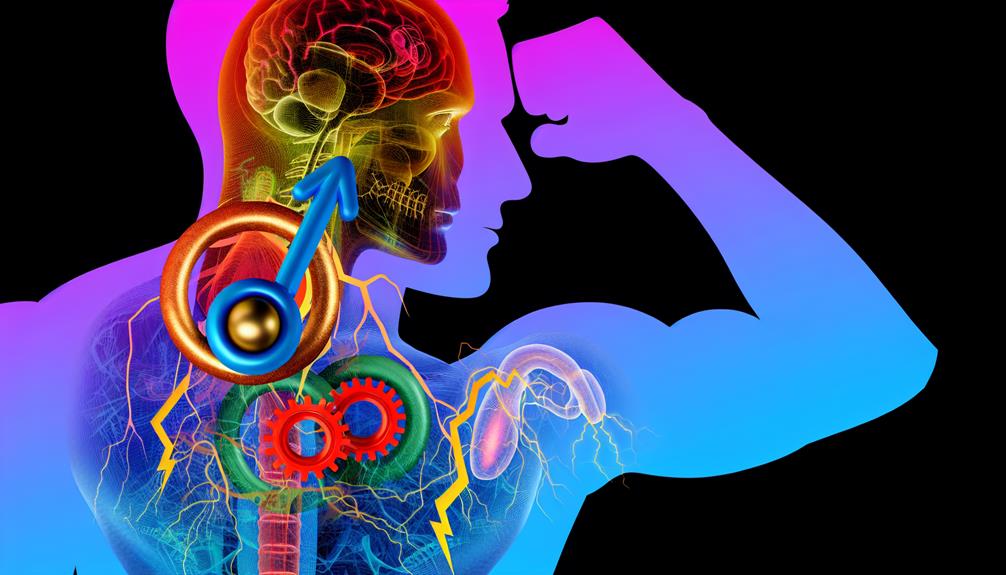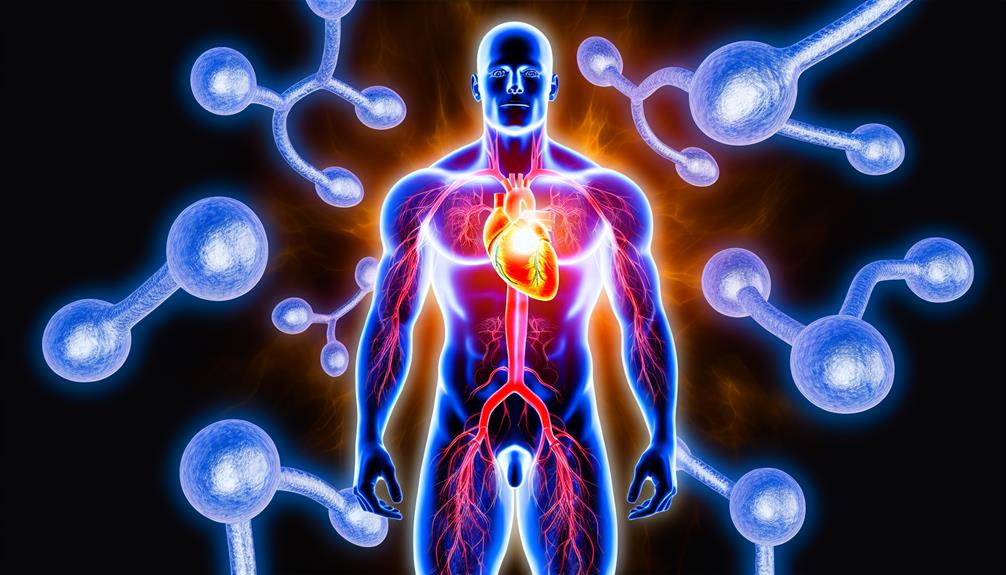Testosterone is vital for male health, impacting various areas like muscle mass, mood, and sexual function. I've seen how it regulates energy levels and supports the development of muscle strength. As men age, testosterone levels naturally decline, leading to potential issues like fatigue, decreased libido, and mood disorders. Additionally, low testosterone can affect bone density and fat distribution, increasing health risks. While lifestyle changes can help boost testosterone, some may require medical intervention. Understanding this hormone's role can greatly enhance one's overall well-being, and there's much more to explore regarding its impacts and management.
Understanding Testosterone

Testosterone is often misunderstood, yet it plays an essential role in male health. As I explore this topic, I find that many people cling to testosterone myths that distort its true function. For instance, some believe that testosterone is solely responsible for muscle mass and aggression. While it's true that testosterone influences muscle growth, its role is much broader, affecting mood, energy levels, and even cognitive function.
In my research, I've come across various claims surrounding testosterone supplementation. Many men consider it a quick fix for low energy or decreased libido, but it's vital to approach this with caution. Evidence suggests that while testosterone therapy can be beneficial for those with clinically low levels, it's not a panacea. Overuse can lead to serious health complications, including cardiovascular issues and hormonal imbalances.
Additionally, I've noticed a trend where testosterone supplementation is often marketed without sufficient understanding of individual health needs. It's essential to recognize that not all men require supplementation, and simply boosting testosterone levels doesn't guarantee improved health or performance.
Ultimately, understanding testosterone involves recognizing its complex role in the body and dispelling the myths that surround it. It's a hormone that deserves respect and careful consideration. Before jumping into supplementation, I urge anyone to consult with healthcare professionals and undergo appropriate testing. This way, we can better understand our bodies and make informed decisions that genuinely support our health.
Testosterone Production Process
In exploring the testosterone production process, I find it essential to understand the hormonal pathway that governs its synthesis. Various factors, including age, health status, and lifestyle choices, can greatly influence this production. By analyzing these elements, we can better appreciate how testosterone levels vary among individuals and the implications for male health.
Hormonal Pathway Overview
The intricate hormonal pathway responsible for testosterone production begins in the hypothalamus, which plays a vital role in regulating hormone levels in the body. This process is essential for maintaining endocrine balance and is governed by hormonal feedback mechanisms that guarantee testosterone levels remain within ideal ranges.
Here's a concise overview of the testosterone production process:
- Hypothalamus: It secretes Gonadotropin-Releasing Hormone (GnRH), signaling the pituitary gland.
- Pituitary Gland: In response to GnRH, it releases Luteinizing Hormone (LH) and Follicle-Stimulating Hormone (FSH), which are fundamental for stimulating the testes.
- Testes: LH specifically stimulates Leydig cells in the testes to produce testosterone, while FSH is involved in sperm production.
- Hormonal Feedback: Elevated testosterone levels signal back to the hypothalamus and pituitary to regulate further hormone release, maintaining a delicate endocrine balance.
This pathway illustrates the complexity of hormonal interactions and the importance of feedback mechanisms in sustaining male health. Understanding this process is key to recognizing how disruptions can affect testosterone levels and overall well-being.
Factors Affecting Production
Numerous factors can substantially impact testosterone production in men, influencing both physiological and psychological health. Understanding these influences is vital for maintaining ideal testosterone levels.
| Factor | Impact on Testosterone Production | Notes |
|---|---|---|
| Dietary Influences | Nutrient-rich diets promote production | Lack of essential fats and vitamins can hinder levels |
| Environmental Factors | Toxins can disrupt hormone balance | Chemicals like BPA may lower testosterone |
| Genetic Predisposition | Inherited traits affect hormone levels | Family history of hormonal issues can be relevant |
| Lifestyle Habits | Sedentary lifestyle decreases production | Regular physical activity boosts testosterone |
| Stress Levels | Chronic stress elevates cortisol | High cortisol can negatively affect testosterone |
As I reflect on these factors, I see how lifestyle habits, such as sleep quality and substance use, further complicate this balance. Age-related changes also contribute greatly to hormonal imbalances, and it's essential to stay aware of how these elements interplay. By taking a proactive approach to manage stress, improve sleep, and adopt healthier dietary choices, I can positively influence my testosterone production and overall well-being.
Decline of Testosterone With Age

As men age, a gradual decline in testosterone levels becomes almost inevitable, impacting various aspects of health and well-being. It's essential to understand this decline isn't merely a myth; it's a documented phenomenon supported by research. Many fell victim to testosterone myths, believing that low levels are a natural part of aging without recognizing the associated health implications.
The aging effects can manifest in several ways, and I've noticed some common symptoms that may resonate with others:
- Decreased Energy Levels: I often feel more fatigued, even after a full night's sleep.
- Mood Changes: There are times I experience irritability or mild depression, which I've come to realize can be linked to lower testosterone.
- Reduced Libido: It's not just a cliché; my interest in intimacy has noticeably diminished over time.
- Cognitive Changes: I sometimes struggle with memory and concentration, which might be tied to hormonal shifts.
Research indicates that testosterone levels typically peak in late adolescence and begin to decline by about 1% per year after the age of 30. This gradual reduction can lead to a cascade of physiological changes that affect overall health.
It's vital to address these changes proactively, as they can greatly influence quality of life. Understanding the realities of testosterone decline rather than succumbing to myths can empower men to seek appropriate evaluations and potential treatments, ensuring they maintain their health as they age.
Effects on Muscle Mass
Testosterone plays an essential role in stimulating muscle growth, which I've observed in various studies showing its impact on protein synthesis. Higher testosterone levels are linked to enhanced strength and overall performance, making it a key factor for those looking to improve their physical capabilities. Understanding this relationship can help us appreciate the importance of maintaining healthy testosterone levels for ideal muscle health.
Muscle Growth Stimulation
When it comes to building muscle, the role of testosterone can't be overstated. This hormone considerably influences muscle growth through various mechanisms, impacting factors essential for hypertrophy. As I've explored the relationship between testosterone and muscle development, I've identified some vital aspects that deserve attention:
- Protein Synthesis: Testosterone enhances the body's ability to synthesize proteins, essential for muscle recovery and growth.
- Workout Intensity: Higher testosterone levels can boost workout intensity, leading to better performance in resistance exercises.
- Exercise Frequency: Regular strength training, coupled with ideal testosterone levels, can improve muscle endurance and overall fitness.
- Nutrition Impact: Adequate nutrition supports testosterone production, creating a synergistic effect on muscle gains.
It's important to note that while some individuals may consider anabolic steroids to amplify testosterone levels, the associated risks often outweigh the benefits. Instead, focusing on natural methods, such as nutrition and consistent strength training, can effectively promote muscle growth. By understanding these hypertrophy factors, we can better harness the power of testosterone to achieve our fitness goals, ensuring a safe and sustainable approach to muscle development.
Strength and Performance Enhancement
The relationship between testosterone and strength is significant, markedly impacting overall performance and muscle mass. As I've explored research, it's become evident that testosterone plays a fundamental role in muscle hypertrophy, particularly during strength training. Higher testosterone levels correlate with increased muscle protein synthesis, which is necessary for gaining muscle mass and improving performance metrics.
In my experience, athletes and fitness enthusiasts who optimize their testosterone levels often notice substantial improvements in strength and endurance. Studies suggest that testosterone not only enhances muscle size but also boosts recovery rates following intensive workouts. This hormonal influence allows for a more effective training regimen, enabling individuals to push their limits without succumbing to fatigue as quickly.
Moreover, testosterone's effects extend beyond just muscle growth. It influences energy levels, mood, and motivation, all of which are essential for consistent strength training. As a result, maintaining balanced testosterone levels can be a game-changer for anyone looking to enhance their performance. Understanding this relationship is significant for anyone aiming to maximize their workout outcomes and overall athletic potential.
Impact on Bone Density
Understanding how testosterone influences bone density is fundamental for recognizing its role in overall male health. Research indicates that testosterone plays a significant part in maintaining bone mass and strength. Low testosterone levels can lead to decreased bone density, increasing the risk of fractures and osteoporosis. This connection highlights the importance of testosterone supplementation for those with clinically low levels.
Here are four key points regarding testosterone's impact on bone health:
- Bone Mineral Density: Testosterone is essential for the regulation of bone mineral density (BMD). Studies have shown that men with higher testosterone levels tend to have greater BMD, which is important for preventing fractures.
- Osteoblast Activity: Testosterone stimulates osteoblasts, the cells responsible for bone formation. Increased osteoblast activity leads to enhanced bone density and strength.
- Age-Related Decline: As men age, testosterone levels naturally decline, often resulting in a reduction in bone density. This makes monitoring testosterone levels especially important for older men.
- Supplementation Benefits: Research supports that testosterone supplementation can improve bone density in men with low testosterone levels, thereby reducing the risk of osteoporosis and fractures.
Influence on Mood and Mental Health
I've observed that testosterone levels can profoundly influence mood and mental health, particularly in relation to depression. Research indicates that lower testosterone levels are often associated with increased depressive symptoms, suggesting a complex interplay between hormones and emotional well-being. Understanding the mechanisms of mood regulation linked to testosterone can provide valuable insights into effective treatment options for mood disorders in men.
Testosterone and Depression
Testosterone greatly influences mood and mental health, with emerging research suggesting a complex relationship between hormone levels and depressive symptoms in men. Low testosterone levels can lead to mood disorders, impacting emotional well-being and mental resilience. I've found that understanding this connection can be essential for those experiencing symptoms of depression.
Here are a few key points to reflect on regarding testosterone and depression:
- Testosterone Therapy: Some studies indicate that testosterone therapy may improve mood in men with low levels, potentially alleviating depressive symptoms.
- Age Factor: As men age, testosterone levels naturally decline, which may contribute to an increased risk of mood disorders.
- Biological Mechanisms: Testosterone influences neurotransmitters like serotonin and dopamine, which are crucial for regulating mood.
- Individual Variation: Each man's response to testosterone therapy can vary greatly, highlighting the need for tailored approaches in treatment.
Mood Regulation Mechanisms
While many factors contribute to mood regulation, hormonal influences, particularly testosterone, play a significant role in shaping emotional well-being. I've observed that fluctuations in testosterone levels can lead to distinct mood swings and impact emotional stability. Research indicates that lower testosterone levels are often correlated with increased irritability and anxiety, while balanced levels tend to foster a more stable mood.
To illustrate the impact of testosterone on mood regulation, consider the following table:
| Testosterone Level | Mood Outcome | Emotional Stability |
|---|---|---|
| Low | Increased irritability | Decreased stability |
| Normal | Balanced emotions | High stability |
| High | Elevated confidence | Variable stability |
| Fluctuating | Mood swings | Low stability |
| Supplemented | Improved mood | Enhanced stability |
Understanding these mechanisms is essential. It's evident that maintaining ideal testosterone levels is important not just for physical health, but also for emotional health. By recognizing the interplay between testosterone and mood, we can better navigate our emotional landscapes, fostering a more balanced and fulfilling life.
Role in Sexual Function

When it comes to sexual function, testosterone plays a significant role that can't be overlooked. Many people still cling to testosterone myths, believing that low levels only affect libido. However, the reality is much more complex. My experience has shown that testosterone greatly impacts various aspects of sexual health.
Here are four key areas where testosterone is essential:
- Libido: Testosterone is directly linked to sex drive. Lower levels can lead to a noticeable decrease in sexual desire.
- Erectile Function: Adequate testosterone is fundamental for achieving and maintaining erections. Insufficient levels can contribute to erectile dysfunction.
- Sperm Production: Testosterone is crucial for spermatogenesis. Low testosterone can lead to reduced sperm count and fertility issues.
- Mood and Confidence: Testosterone influences mood and self-esteem, which can, in turn, affect sexual performance and desire.
Understanding these elements can help debunk common testosterone myths. For instance, it's not just about wanting sex; it's about the body's overall functioning. Low testosterone levels can result in various complications, impacting not only sexual health but also mental and emotional well-being.
Testosterone and Fat Distribution
When I consider the relationship between testosterone and fat distribution, it's clear that this hormone plays a significant role in determining how fat is stored in the body. Research shows that lower testosterone levels can lead to an increase in body fat, particularly in the abdominal area, which can have serious health implications. Understanding these changes in body composition is essential for addressing overall male health and wellness.
Hormonal Influence on Fat
Testosterone plays an essential role in determining fat distribution in men, influencing how and where the body stores fat. The relationship between testosterone and fat metabolism is complex, and hormonal balance is critical for maintaining a healthy weight. As I've explored this topic, I've identified several key factors that highlight testosterone's influence on fat:
- Fat Distribution: Testosterone promotes the accumulation of visceral fat, which is associated with various health risks, while also aiding in the reduction of subcutaneous fat.
- Metabolic Rate: Higher testosterone levels can boost the metabolic rate, facilitating more efficient fat burning.
- Muscle Mass: Testosterone helps in maintaining lean muscle mass, which plays a significant role in increasing basal metabolic rate and further aids in fat loss.
- Insulin Sensitivity: Adequate testosterone levels enhance insulin sensitivity, thereby improving the body's ability to manage fat storage and usage.
Understanding these factors can help men make informed choices about their health. By maintaining hormonal balance, it's possible to optimize fat metabolism and improve overall well-being.
Body Composition Changes
One's body composition can significantly shift due to variations in testosterone levels, impacting both fat distribution and overall health. Research shows that testosterone plays an essential role in regulating body fat and muscle definition. Higher testosterone levels are associated with a leaner physique, as it promotes a favorable metabolic rate and energy balance. When testosterone decreases, often due to age-related changes, I've noticed an increase in body fat, particularly around the abdomen, which can lead to significant health risks.
Dietary influences and exercise impact also interact with testosterone. A balanced diet rich in proteins and healthy fats, combined with regular strength training, can enhance testosterone production, further aiding in maintaining muscle mass and reducing body fat. The hormonal interplay of testosterone with other hormones, like insulin and cortisol, is key in determining how our bodies store fat and build muscle.
As we age, monitoring these changes becomes essential. Understanding how testosterone affects body composition can help us make informed decisions about lifestyle adjustments, ultimately improving physical appearance and reducing potential health risks associated with poor body composition.
Health Implications of Distribution
Fat distribution has significant health implications, particularly in relation to testosterone levels. I've learned that testosterone distribution affects how fat is stored in the body, which can lead to various health consequences. When testosterone levels drop, especially in men, body fat tends to accumulate around the abdomen, a pattern associated with increased health risks.
Here are some critical points to evaluate:
- Increased Risk of Cardiovascular Disease: Higher abdominal fat is linked to hypertension and heart disease.
- Metabolic Syndrome: This condition, characterized by obesity, insulin resistance, and dyslipidemia, is more prevalent in those with low testosterone levels.
- Type 2 Diabetes: Poor testosterone distribution can contribute to insulin resistance, raising the likelihood of developing diabetes.
- Mental Health Issues: Changes in fat distribution may also correlate with mood disorders, such as depression and anxiety.
Understanding these implications helps highlight the importance of maintaining healthy testosterone levels for ideal fat distribution. Through lifestyle changes and medical interventions, we can mitigate these risks and promote better overall health.
Connection to Heart Health

Often overlooked in discussions about male health, the connection between testosterone levels and heart health is significant. Research indicates that testosterone plays an essential role in cardiovascular function. Low testosterone levels have been linked to various cardiovascular risks, including hypertension, increased fat mass, and insulin resistance, all of which can adversely affect heart health.
Testosterone, a fundamental hormone in the male body, influences metabolism and vascular function. It helps regulate the production of red blood cells, promoting better oxygenation of tissues, which is necessary for maintaining cardiovascular health. Studies suggest that men with low testosterone levels are at a higher risk of experiencing adverse cardiovascular events, such as heart attacks and strokes. This relationship is not merely correlative; some evidence supports the idea that testosterone therapy could potentially reduce cardiovascular risks in men with testosterone deficiency.
Moreover, testosterone impacts the body's metabolism, influencing how fat is distributed and utilized. An imbalance in testosterone can lead to poor metabolic health, which is a known risk factor for heart disease. The hormone also affects the health of blood vessels, contributing to their elasticity and function.
Effects on Energy Levels
Testosterone greatly influences energy levels in men, acting as an essential regulator of physical and mental vigor. It's fascinating to see how this hormone impacts our daily lives, especially regarding energy fluctuations. When testosterone levels are ideal, I often experience a consistent sense of energy and motivation. However, when those levels dip, I can feel the difference quite markedly.
Here are some key aspects regarding testosterone's effects on energy levels:
- Muscle Mass: Testosterone contributes to increased muscle mass, which helps enhance overall strength and endurance. The more muscle I have, the more energy I can exert during physical activities.
- Fat Distribution: This hormone aids in regulating fat distribution in the body. Maintaining a healthy weight can considerably improve my energy levels, making me feel more agile and alert.
- Mood Regulation: Testosterone plays a crucial role in mood stabilization. A balanced hormone level helps reduce fatigue and promotes a more positive outlook, which directly correlates with energy levels.
- Sleep Quality: Adequate testosterone levels are linked to better sleep quality. When I sleep well, my energy levels during the day are considerably higher, enhancing my overall vigor.
Understanding these connections helps me appreciate the importance of maintaining healthy testosterone levels for vigor enhancement. By prioritizing my health, I can work towards a more energetic and fulfilling life.
Testosterone Deficiency Symptoms
Many men may not realize they're experiencing testosterone deficiency until they encounter various symptoms that can greatly impact their quality of life. The symptoms can be subtle at first, often dismissed as just part of aging or stress. However, when I started paying attention, I noticed considerable changes in my body and mood. Low energy, reduced muscle mass, and decreased libido were just a few signs that something was off.
According to established diagnostic criteria, testosterone deficiency is characterized by total testosterone levels below 300 ng/dL, combined with these accompanying symptoms. It's essential to recognize that not all fatigue or mood swings are indicative of low testosterone. There are several testosterone myths suggesting that low testosterone only affects older men, but this simply isn't true. Young men can also face deficiencies, often stemming from lifestyle factors like obesity or chronic stress.
Moreover, cognitive changes, such as difficulty concentrating or memory issues, can also occur with low testosterone levels. If you find yourself experiencing these symptoms, it's critical to consult a healthcare provider who can evaluate your testosterone levels accurately and not rely solely on self-diagnosis or anecdotal evidence.
Understanding the full spectrum of testosterone deficiency symptoms is important for any man's health. I encourage you to stay informed and not fall victim to common misconceptions. Awareness and timely intervention can greatly improve your quality of life.
Testing Testosterone Levels
Evaluating testosterone levels is essential for identifying potential deficiencies and understanding their impact on health. As I've learned, accurate testosterone testing can provide significant insights into male health issues, especially when symptoms suggest a deficiency. There are several testing methods available, each with its own strengths and considerations.
- Blood Tests: This is the most common method. A healthcare provider takes a blood sample, usually in the morning, when testosterone levels are at their peak. This test can measure total testosterone as well as free testosterone levels.
- Saliva Tests: While less common, saliva testing can be convenient. It measures free testosterone levels and can be done at home, but its accuracy compared to blood tests is still debated.
- Urine Tests: These are less frequently used for testosterone testing but can provide information about hormone levels over a 24-hour period. It's more thorough but may not be as readily available.
- DHEA Testing: Dehydroepiandrosterone (DHEA) is a precursor to testosterone. Testing DHEA can help evaluate adrenal function and its relationship to testosterone levels.
Choosing the right testing method depends on individual circumstances and should be discussed with a healthcare professional. Understanding these methods is an essential step in determining testosterone levels accurately, allowing for better-informed decisions regarding treatment and lifestyle adjustments.
Lifestyle Changes to Boost Testosterone

After understanding how to assess testosterone levels, it's important to explore practical approaches to enhance them naturally. I've found that certain lifestyle changes can considerably impact testosterone levels, and incorporating these practices can lead to improved overall health.
Here's a quick overview of effective lifestyle changes:
| Lifestyle Change | Description |
|---|---|
| Dietary Modifications | Focus on whole foods, healthy fats, and proteins. |
| Exercise Routines | Engage in strength training and high-intensity workouts. |
| Sleep Quality | Aim for 7-9 hours of quality sleep per night. |
| Stress Management | Practice mindfulness and relaxation techniques. |
| Weight Management | Maintain a healthy weight to reduce estrogen levels. |
In my experience, dietary modifications like increasing healthy fats and reducing processed sugars can boost testosterone. Regular exercise routines, especially those focused on resistance training, have shown to elevate levels effectively.
Sleep quality is non-negotiable; inadequate rest can lead to hormonal imbalances. Stress management through mindfulness practices, such as meditation, has also been beneficial for me, as chronic stress can cause testosterone levels to plummet.
Weight management plays a vital role too. Excess body fat can lead to higher estrogen levels, negatively affecting testosterone. Natural supplements, like vitamin D and zinc, can support hormone production, and staying hydrated is essential for overall health. Finally, fostering positive social interactions can enhance mood and well-being, further supporting hormonal balance.
Medical Treatments for Low Testosterone
When it comes to addressing low testosterone levels, medical treatments can play an essential role in restoring hormonal balance. For those who've explored lifestyle changes and still struggle with symptoms, various medical interventions are available. It's important to understand the options, their potential side effects, and the significance of ongoing monitoring.
Here are four common medical treatments for low testosterone:
- Testosterone Replacement Therapy (TRT): This involves administering synthetic testosterone to restore levels. It can be done through injections, patches, or gels.
- Androgen Treatments: These may focus on stimulating the body's natural production of testosterone rather than simply replacing it.
- Hormone Therapy: This can include medications that target other hormones, potentially influencing testosterone levels indirectly.
- Monitoring Levels: Regular blood tests are essential to track testosterone levels and adjust treatments accordingly, minimizing health risks.
While these options can be effective, they do come with potential side effects, such as mood swings, acne, or increased risk of cardiovascular issues. As a result, patient education is essential to weigh the treatment costs against possible health risks.
Frequently Asked Questions
Can Testosterone Affect Hair Growth in Men?
Did you know that about 50% of men experience some degree of hair loss by age 50? It's fascinating how testosterone affects hair follicles. While testosterone itself doesn't directly cause hair growth, its derivative, dihydrotestosterone (DHT), can shrink hair follicles, leading to thinning hair. I've seen how this relationship plays out in my own life, as fluctuations in testosterone levels can greatly impact hair growth patterns. Understanding this connection is essential for managing hair health.
Is There a Link Between Testosterone and Sleep Quality?
I've found that there's indeed a link between testosterone levels and sleep quality. Research suggests that hormonal balance, including testosterone, influences sleep patterns and circadian rhythms. Low testosterone can contribute to sleep disorders like sleep apnea, which disrupts quality sleep. Furthermore, testosterone plays a role in mood regulation, affecting how well we rest. Maintaining healthy testosterone levels could be essential for achieving restorative sleep and overall well-being.
How Does Testosterone Influence Cognitive Function?
Have you ever felt like your brain's in a fog? Well, testosterone's got a big role in clearing that up! It influences cognition by enhancing memory and focus. When hormonal balance is off, it can lead to cognitive decline. Studies show that ideal testosterone levels may improve executive function and overall mental performance. So, keeping those levels in check isn't just about muscles; it's essential for a sharp mind, too!
Are There Natural Supplements to Boost Testosterone Levels?
I've often wondered about natural supplements to boost testosterone levels. Some herbal remedies, like fenugreek and ashwagandha, show promise in studies for enhancing testosterone. Additionally, I've noticed that regular exercise, particularly resistance training, can also provide significant benefits. It's fascinating how lifestyle choices can impact hormone levels, and I always recommend consulting with a healthcare professional before starting any supplement regimen to guarantee it's safe and effective for you.
What Are the Myths Surrounding Testosterone Replacement Therapy?
When discussing testosterone replacement therapy, I've encountered several testosterone myths and therapy misconceptions. Many believe it's solely for aging men, ignoring its medical necessity for those with low levels. Another myth is that it guarantees muscle gain, which isn't true without proper exercise. Additionally, some fear it leads to aggressive behavior, but research shows this isn't a universal outcome. It's essential to approach these claims critically and rely on evidence-based information.
